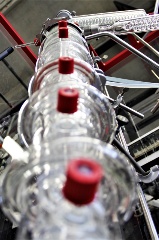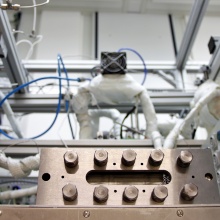About our institute
The research area of heterogeneous catalysis deals with scientific investigations (both fundamental and process related) of zeolites, supported metal catalysts, and redox-active oxides or oxide layers, which are synthesized, characterized, and thoroughly tested in the ITC.
The research area of chemical reaction engineering also deals with the scientific investigations (both fundamental and process related) of technical reaction control and reactor designs with an emphasis on heterogeneous catalysis engineering, micro reaction engineering, and electrochemical reaction engineering. (link to the Klemm Group Website)
The research area of Molecular Heterogeneous Catalysis (MHC) is concerned with the synthesis and reactions of molecularly well-defined catalyst species immobilized on support surfaces as a way of understanding structure-activity relationships in heterogeneous catalysis. In particular, we use MHC methods to investigate the origins of strong metal-support interactions (SMSIs) in reactions such as CO2 reduction and Mars-van-Krevelen Oxidations. (
Research topics at the Institute of Technical Chemistry

Solid acid/base catalysis
Synthesis of zeolite catalysts; characterization; in-situ solid-state NMR
Examples of application: Dehydration of e.g. lactic acid or ethanol; dehydrogenation in combination with amidation or oxidation reactions; catalytic cracking of bio-oils; methanol-to-olefins
Oxidation catalysis
Synthesis of Mars-van-Krevelen catalysts, monolayer supported catalysts and metal supported catalysts; characterization; isothermal reaction engineering investigations; explosion prevention
Examples of application: Selective oxidation of o-xylene, n-butane and methane
Hydrogenation catalysis
CO2 Hydrogenation
Molecular Heterogeneous Catalysis
Surface Organometallic Chemistry; Immobilized molecular catalysts; Metal-Support Interactions
Examples of Applications: CO2 hydrogenation, Oxidation catalysis, Biomass Hydrodeoxygenation, Atom Transfer Reactions
Micro reaction engineering
Fixed bed micro-reactors; slit-reactors with catalyst coatings; multi-phase reactions in slug-flow systems; thermography
Examples of application: Oxidation of cyclohexane; ethoxylations; anionic polymerization of butadiene
Electrochemical reaction engineering
Gas Diffusion Electrodes; H-type cells; flow cells; linear sweep voltametry; potensiostatic and galvanostatic measurements
Examples of application: CO2-reduction to formic acid for chemical storage and substrate supply of fermenters; CO2-reduction to alcohols
News at the ITC
University of Stuttgart is taking part in eForFuel,:
University of Stuttgart is taking part in eForFuel, an exciting EU-funded research and
innovation initiative that seeks to provide a sustainable replacement of fossil fuels by
using electricity and microorganisms to convert CO2 into renewable fuels.t.
ITC in the CRC 1333
As of July 2022, the 2nd funding period of the CRC 1333 “Molecular Heterogeneous Catalysis in Confined Geometries” has begun at the University of Stuttgart, with the Estes and Klemm groups from the ITC participating across three different subprojects. These projects will try to better understand how confinement inside porous media affects the activity and selectivity of both electrocatalytic and thermal CO2 reduction as well as pre-catalyst assembly.
Further information (in German)
Team of the ITC List of publications Teaching at the ITC Alumni Contact usContact

Elias Klemm
Prof. Dr.-Ing.Head of Institute

Deven Estes
Jun.-Prof.Dr.Elisa Favaro
Assisstant to the Head of Institute






